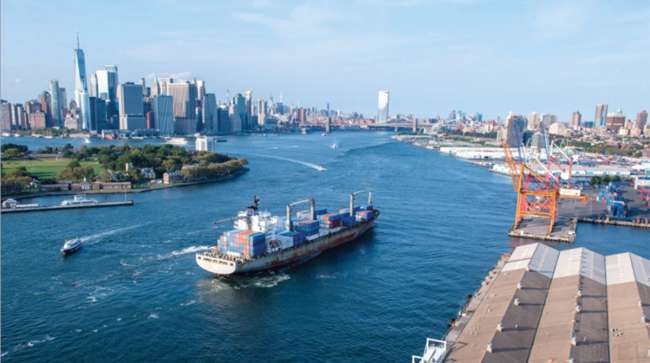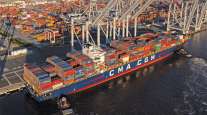Senior Reporter
House Passes Supply Chain Shipping Bill

[Stay on top of transportation news: Get TTNews in your inbox.]
Legislation designed to enhance maritime supply chain connectivity was recently passed in the U.S. House of Representatives.
The Ocean Shipping Reform Implementation Act, sponsored by Reps. Dusty Johnson and John Garamendi, was approved on March 21 by a vote of 393 to 24.
The bipartisan House bill would prohibit domestic port operators from accessing certain software specific to China. It would allow the Federal Maritime Commission to examine and review certain foreign shipping exchanges, and it would promote maritime freight logistics operations. The bill also would assign the Bureau of Transportation Statistics to collect distinct data about port operations.
Sponsors explained the legislation is meant to safeguard national companies that transport freight at U.S. maritime ports. They argued the bill advances existing provisions in the Ocean Shipping Reform Act, which President Joe Biden enacted in 2022.
South Dakota relies on a functioning supply chain to export $7 billion of products each year.
My bill, the Ocean Shipping Reform Implementation Act, gives the FMC the authority to crack down on unfair practices by bad actors. It just passed the House overwhelmingly.
I hope the… pic.twitter.com/vncIHsEAiO — Rep. Dusty Johnson (@RepDustyJohnson) March 21, 2024
“House passage of [Ocean Shipping Reform Act 2.0] gets us one step closer to further securing our ocean shipping supply chains,” said Johnson (R-S.D.). “The [Federal Maritime Commission] needs authority to crack down on China’s unfair shipping practices. I hope the Senate considers our bill soon.”
Garamendi (D-Calif.) said, “In 2022, Congress passed our landmark reform to the nation’s ocean shipping laws for the first time in nearly a quarter century to protect American businesses and consumers from price gouging by foreign-flagged ocean liners. [Rep.] Johnson and I are committed to seeing that bipartisan 2022 law implemented fully to support American exporters and correct our nation’s long-standing trade imbalance with countries like China.
“We are finally making free trade fair trade and stopping Chinese state-controlled companies from ripping off our country and gutting our manufacturing jobs. Our implementation bill introduced today will finish the job.”
Johnson and Garamendi are members of the Transportation and Infrastructure Committee. The bill’s consideration in the Senate has yet to be scheduled. Members of Congress return from an Easter recess the week of April 8.
Various stakeholders, such as American Trucking Associations, applauded the bill’s passage in the House.
“ATA thanks Reps. Johnson and Garamendi for their continued leadership to address ocean shipping issues and encourages Congress to pass their Ocean Shipping Reform Implementation Act. Strong bipartisan support for passage of [the Ocean Shipping Reform Act] has resulted in historic and long-awaited improvements to practices at our nation’s maritime ports,” said Henry Hanscom, ATA’s senior vice president of legislative affairs, in a statement shared by the bill’s sponsors. “Those new regulations are making major strides in ensuring that trucking fleets of all sizes, as well as American agricultural shippers and others moving goods through our ports, are treated fairly by foreign-owned shipping lines. ATA and the Intermodal Motor Carriers Conference are grateful for the continued attention to these vital supply chain issues.”
Want more news? Listen to today's daily briefing above or go here for more info
“The Ocean Shipping Reform Implementation Act picks up where the Ocean Shipping Reform Act left off last Congress. Most importantly, the bill continues to focus on data standardization and collections that are critical to providing the full picture of what is happening in the supply chain and being able to address the next disruption,” said David French, senior vice president of government relations for the National Retail Federation.
The Ocean Shipping Reform Act paves the way for expanding oversight of the shipping industry specific to demurrage and detention charges. As Biden explained in 2022: “During the pandemic, ocean carriers increased their prices by as much as 1,000%. And, too often, these ocean carriers are refusing to take American exports back to Asia, leaving with empty containers instead. That’s costing farmers and ranchers — and our economy — a lot of money.”




